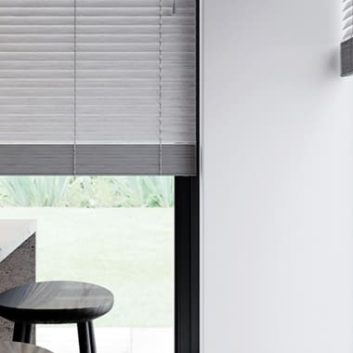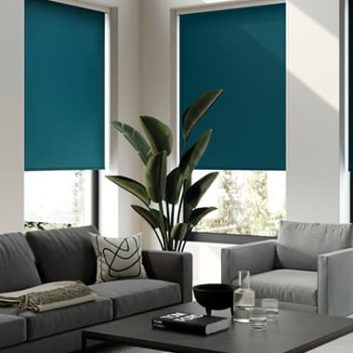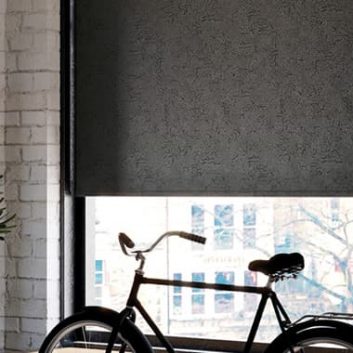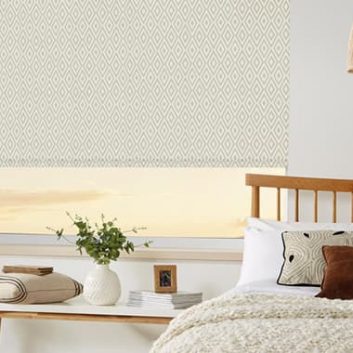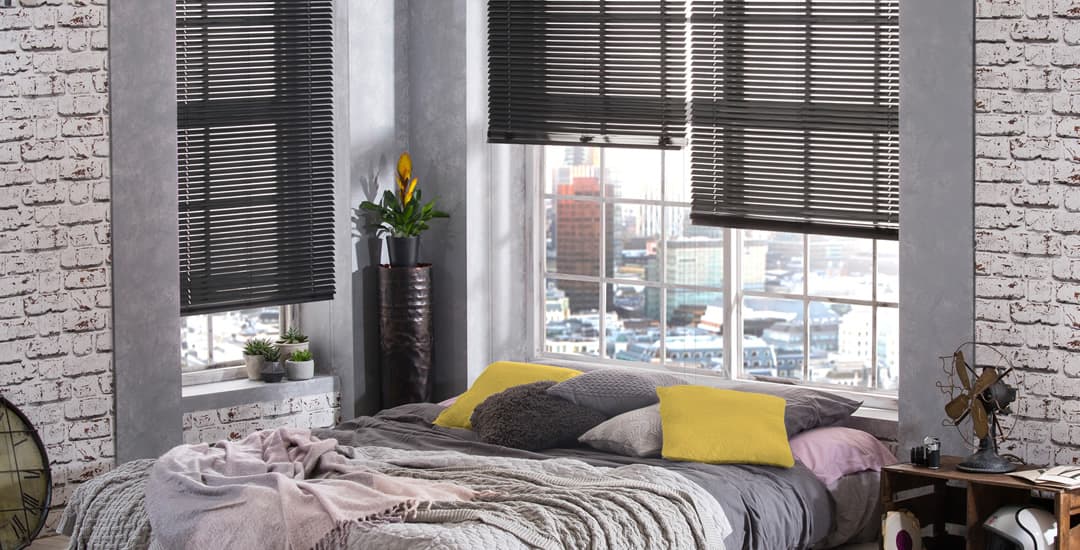
Venetian blinds are the type of blinds that are made of multiple rows of horizontal slats. As well as raising and lowering the whole blind in the normal fashion, you can also tilt those slats to filter light without blocking it entirely, which is handy if a room is overly bright, and/or causes screen glare.
But daytime applications aside, do Venetian blinds work in bedrooms too? Yes, Venetian blinds are a perfectly fine choice for your bedroom depending on what sort of style you’re looking for, and what functions you want your blind to fulfil.
Venetian blinds come in various different types and materials, and so will fit in with most types of home designs; and some Venetian blinds can achieve a blackout effect in the bedroom if hung correctly too.
This blog post will start with a short primer on what Venetian blinds are and the different options that they can be found in. I’ll then share some basic info on the pros and potential cons of using Venetian blinds of various different types as bedroom blinds.
What are Venetian blinds?
The term “Venetian blind” technically refers to any type of horizontally slatted blind. However, when people say “Venetian blind” without qualifying it in terms of the material it’s made of, they’re almost always referring to aluminium Venetian blinds.
The other two common materials used for Venetian blinds are real wood blinds and faux-wood blinds respectively; you can also get plastic Venetian blinds from some retailers (but not us, as they look kind of… Plasticky, which doesn’t tend to be a common request from our customers).
So, (aluminium) Venetian blinds, faux-wood Venetian blinds, and real wood Venetian blinds are the three big hitters in the slatty blinds stakes, and all three of these types of blinds can be made with lift cords running up through the ends (and possibly other points for wider blinds) of the slats to allow the blind to be raised and lowered.
Real wood and faux-wood Venetian blinds (but generally not aluminium Venetian blinds) can also be made with ladder tapes instead of lift cords. These run up the outside of the slats, and can form an additional decorative or design element of the blind in their own right; and they also don’t require little holes to be made in each slat for them to pass through, which I’m mentioning specifically as this will become pertinent later on.
But are Venetian blinds a good pick for bedrooms? First up, there’s never a one-size fits all answer to any question regarding what type of blind is best. For bedrooms specifically, many people want a blackout blind, but this isn’t the case for everyone.
This means that “best for you” and “best for someone else” might mean two very different things; but either way, Venetian blinds can be used as bedroom blinds as long as you understand their benefits and limitations, and these match up in all of the right areas with what you’re looking for from your bedroom blind.
Do Venetian blinds work in bedrooms in terms of their style?
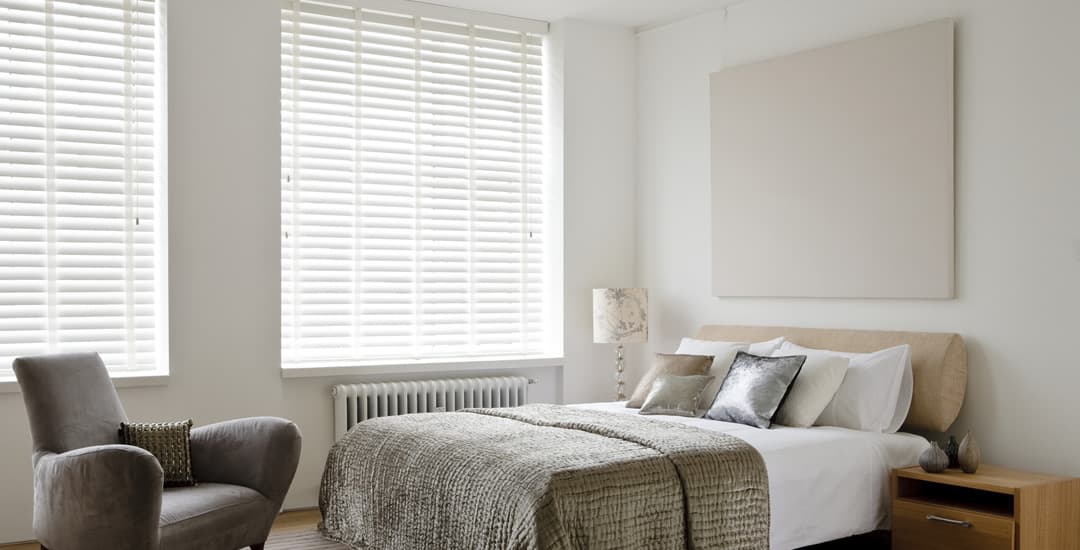
Style-wise, one or more of the three types of Venetian blinds will fit in with many bedroom styles and designs, with the potential exception of bedrooms that are very traditional, in keeping with a period property, or decorated in a cosy or opulent style, these latter bedroom types tending to look better with a fabric blind of some sort.
Also, aluminium Venetian blinds specifically have a fairly modern look and feel to them, and so this is the blinds type you’re most likely to discount for some bedroom styles.
Also, aluminium Venetian blinds are arguably the bottom of the list of the three Venetian blinds types when it comes to their suitability for a bedroom in functional terms too, largely because they can only be purchased with lift cords and not ladder tapes, which yes, I am still getting on to with my explanation.
Are Venetian blinds suitable for a bedroom?
This really depends on what you class as “suitable.” In terms of stopping people outside from seeing your pale bits, yes, box checked, Venetian blinds of all types have a strong work ethic in this respect.
However, a lot of the time what people really mean when they ask questions like “are Venetian blinds suitable for a bedroom” is “do Venetian blinds make a room dark,” and/or do they achieve a full blackout effect. With that in mind then, I’m finally going to move on to the whole lift cords/aluminium Venetian blinds thing that I’ve alluded to twice now…
Do Venetian blinds make a room dark?
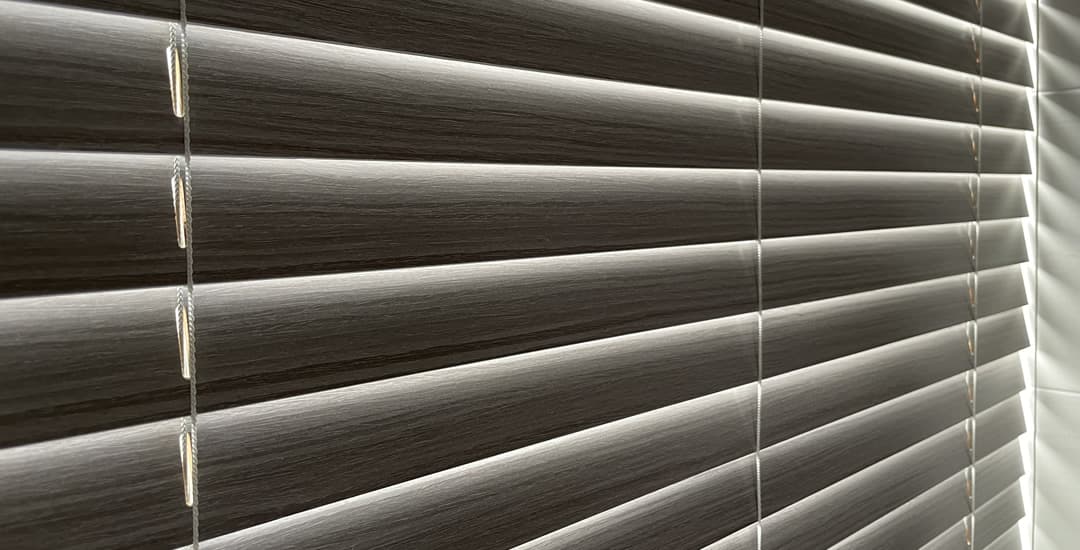
Depending on the type of Venetian blind you pick and the way it’s hung or fitted, Venetian blinds may be capable of achieving a near blackout effect in your bedroom. However, this is only true of Venetian blinds made with ladder tapes rather than lift cords, and if said blinds are hung outside of the window recess with a 10cm or greater margin of coverage over the surrounding wall too.
If hung correctly, Venetian blinds made with ladder tapes can potentially achieve a blackout effect if that’s what you want them to do. Venetian blinds make a room dark only if you can prevent light leakage around the sides of the blind as well though.
When it comes to Venetian blinds with lift cords, these definitely darken a room but generally won’t function as blackout blinds, as you’ve got to factor in both potentially preventable light leakage from around the blind’s sides, and that definitely-not-preventable light leakage due to their lift cords.
It is more or less inevitable that Venetian blinds with lift cords rather than ladder tapes will get a degree of light leakage, due to the tiny holes present in the slats where the lift cords run through them.
What type of blind is best for bedrooms?
While blackout blinds are a must-have for many people when it comes to their bedrooms, this isn’t true for everyone. Some people dislike sleeping in total darkness, or being unable to orient themselves based on what the sun is or isn’t doing outside of the window.
For people who fall into the latter camp, a non-blackout blind or even a blind that would otherwise be a blackout blind were it not for a level of diffuse light leakage around the edges is perfectly fine, or even desirable.
However, when it comes to light leakage around lift cords, while the amount of light this results in isn’t exactly sunburn territory, if your room is otherwise very dark the effect of this can actually be surprisingly noticeable.
This may be annoying if you’re in the market for near-total darkness, and will definitely be annoying if only total darkness will do. This is why for my money, aluminium Venetian blinds are the lest suitable Venetian blind option for a bedroom.
While a lot of people think of fabric blinds like Romans and rollers as being the best choice for bedrooms, this is more of a personal preference than a rule to live by. As long as you like the appearance and style of a blind and know what it’s got going for it and against it in terms of how it works (such as whether or not it will let light in) then fill your boots (or bedroom) with Venetians if you so desire.

